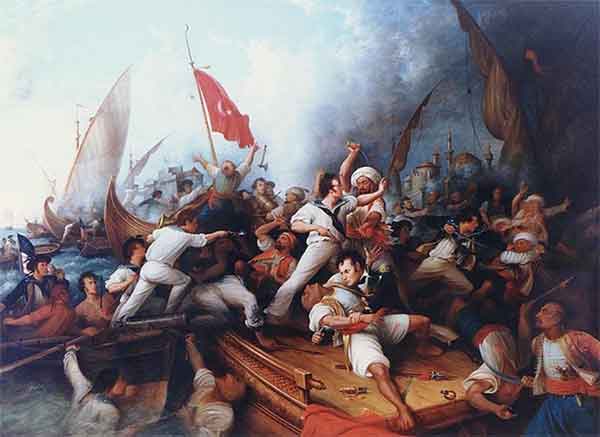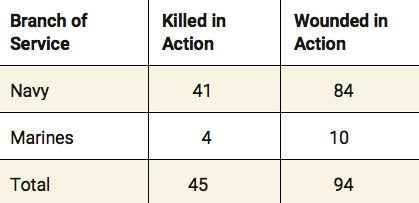The Barbary Wars
1801-1805 and 1815
During the 1780s and ’90s, European states paid the rulers of Morocco, Algiers, Tunis and Tripoli (the North African region known collectively as the Barbary Coast) to capture their competitors’ ships. This raiding was “an organized government activity, not piracy; the United States and other powers negotiated with the North African states to protect their commerce.”

The U.S. was slow to send the tribute it had promised in 1795 for the purpose of freeing more that one hundred American sailors captured two years before, causing the Pasha of Tripoli to demand payment in terms just short of a declaration of war in 1801. President Thomas Jefferson sent the much diminished U.S. Fleet to the Mediterranean, where in cooperation with ships from Sweden, Sicily, Malta, Portugal and Morocco, they forced the Pasha to back down. From then on, a small naval squadron patrolled the North African coast, until the U.S.S. Philadelphia ran aground in 1803, and the Triplolitans seized the ship and her 300-man crew. Lieutenant Stephen Decatur earned his captain’s bars as well as recognition as a true American hero in 1804 when he entered the harbor at Tripoli, burned the Philadelphia, and bombarded the city. The American consul in Tunis, William Eaton organized a force composed of Arabs, Greeks and U.S. Marines to attack the Tripolitan
city of Derne, which they captured just as the U.S. finalized a peace agreement with the Pasha. Decatur returned to the scene once again in 1815 to negotiate a settlement with Algiers, which had declared war on the U.S. in 1807, although no battles were fought due to the fact that the embargo and War of 1812 kept Americans out of the Mediterranean throughout those years.
The United States had gone to war once with the Barbary Pirates and won, but with war approaching with Great Britain, the Barbary Pirates went back to their old ways. The United States emerged from the war of 1812 with a much stronger navy. At the conclusion of the War of 1812, the United States returned to the problem of Barbary piracy. On 3 March 1815, the United States Congress authorized deployment of naval power against Algiers, and the squadron under the command of Commodore Stephen Decatur set sail on 20 May 1815. It consisted of USS Guerriere (flagship), Constellation, Macedonia, Epervier, Ontario, Firefly, Spark, Flambeau, Torch, and Spitfire. In June, Decatur encountered the flagship of the Algerian fleet off the coast of Gibraltar and easily defeated it. On June 28th, the American fleet arrived in Algiers. Decatur demanded an end to the tribute, freedom for all American prisoners, and a payment of $10,000.
The Bay of Algiers tried to buy time, but the USS Independence, a ship of the line, positioned itself off the coast of Algiers, while Decatur advanced on Tripoli and Tunis. The Barbary States were forced to agree to all the American demands. Those demands were met by a treaty signed on July 3, 1815, which included a release of all hostages, the opening of Algerian ports to American ships, the ending of any further piracy, and the payment of $10,000 in damages. The American fleet returned to the United States in triumph. From that moment on America was seen as an emerging world power.
RECOMMENDED READING
To the Shores of Tripoli: the Birth of the U.S. Navy and Marines
by A. B. C. Whipple
Our Navy and the Barbary Corsairs
by Gardner W. Allen
James Madison and the Making of America
by Kevin K. C. Gutzman
All books are available at our Museum Library which is open to the public every Thursday from 10am to 4pm.
AMERICAN CASUALTIES

